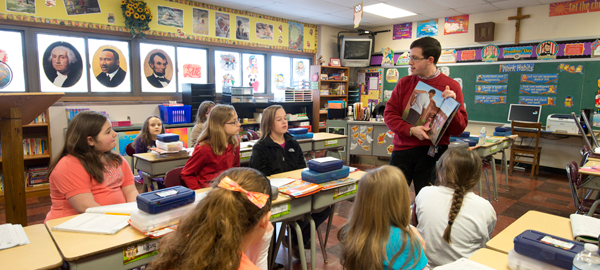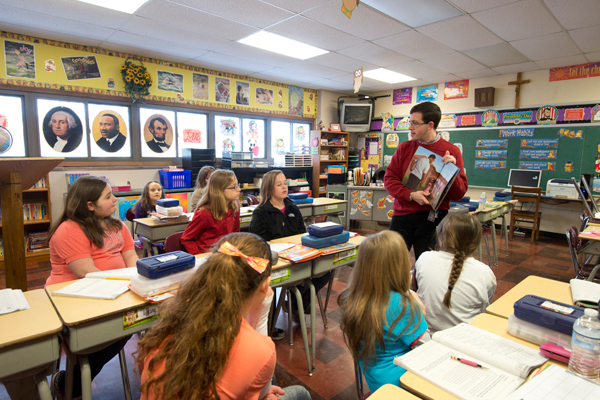St. Bernard Parish in Mt. Lebanon held a ministry fair in 2012 for parishioners who wanted to get more involved in their church. It was a tremendous success, with more than 200 people volunteering for about 50 parish ministries.
The ministry fair represents what Christian Stewardship is all about, according to St. Bernard’s pastor, Father Dave Bonnar—parishioners coming together in a shared sense of responsibility, accountability and belonging.
“Stewardship far transcends giving your time or talent or treasure,” Fr. Bonnar said. “It engenders a real sense of belonging, of wanting to step up for the good of the parish.”
In embracing Christian Stewardship, thousands of donors to Our Campaign for The Church Alive! recognize the historic initiative as an opportunity, not an imposition, in helping make a positive impact on the extraordinary needs across our diocese.
“Stewardship is about living a life of gratitude to God, the giver of all good gifts,” said Dr. Patrick Joyce, director of the diocesan Office for Stewardship. “We cannot simply be passive beneficiaries; we must teach gratitude that motivates action, asking ourselves what can and should we do with these gifts?”
The U.S. Bishops’ Pastoral Letter on Stewardship explains that “as Christian stewards, we receive God’s gifts gratefully, cultivate them responsibly, share them lovingly in justice with others, and return them with increase to the Lord.”
Not only are we stewards of creation, caring for the world that God created, also we are stewards of vocation, according to the bishops. Jesus calls us by name, as his disciples, to a new, Christian way of life.
“Each one of us—clergy, religious, lay person; married, single; adult, child—has a personal vocation,” the bishops wrote. “The challenge…is to understand our role and to respond generously to this call from God.
“People who want to live as Christian disciples and Christian stewards face serious obstacles,” the letter continued. “In the United States and other nations, a dominant secular culture often contradicts religious convictions about the meaning of life. As Catholics…we know what it is to struggle against selfishness and greed, and we make a special effort to understand the true meaning of stewardship and live accordingly.”
“Everything we have comes from God, but how do we grow that?” asked Dolores Nypaver, associate director of the diocesan Office for Stewardship. “It’s important that we pray over what is fair to give back for all we’ve been given.”
Father Garrett Dorsey, administrator of St. Ursula Parish in Allison Park, quotes Psalm 116, ‘What return will I give to the Lord for all he has given me?’ He said his parishioners have been responsive to Stewardship Sundays and getting involved in parish ministries.
Deacon Al Heiles of St. Alphonsus Parish in Wexford, who serves with Ms. Nypaver, Father Dorsey and others on the diocesan Stewardship Advisory Council, describes stewardship as “a complete engagement in the process of building the Kingdom. It means being a true follower of Christ in every sense of the word, and includes prayer, sacrifice and example.
“The campaign is divinely orchestrated,” Deacon Al said. “It has everything to do with the Holy Spirit.”
The Bishops’ Pastoral Letter describes the challenge of stewardship.
“We are obliged to be stewards of the Church—collaborators and cooperators in continuing the redemptive work of Jesus Christ. The Church’s essential mission—proclaiming and teaching, serving and sanctifying—is our task.”
Dr. Joyce poses the key question.
“Who taught you the faith, and are you passing it along?” he asked. “The Church is not a building but a faith community. We have a duty to give it back and pay it forward.”

